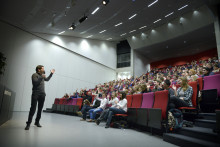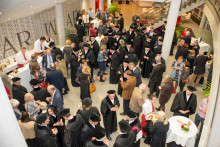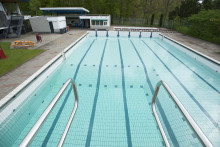It took a while to find the best way to let the stories of the speakers come out as well as possible, says Timmerman. 'It soon became clear that lectures with a large audience would not be possible. With Studium Generale we held several hybrid lectures this autumn, with physical and digital audiences. That's very difficult to make, because which audience are you actually talking to?'
Campus studio
The solution, for both Studium Generale and the Week of Inspiration: a studio in the Amphitheatre. We painted three large wooden panels green, to function as our green screen. We're trying to imitate the setting of the tv show Zomergasten (a one-on-one in-depth interview, ed.) to some extent,' says Timmerman. He knows that also requires a different approach to a lecture. 'You really have to approach it like a TV broadcast, other laws apply. That's why the lectures are relatively short, we change shots in quick succession and we ask the speakers to show a lot of videos.'
Moreover, the broadcasts have to be interactive. 'We have asked study associations to think about questions they would like to ask, so we can include them in the programme. And viewers can ask their questions in the chat, which then go to the moderators,' says Timmerman.
Melting ice caps and sex in the Middle Ages
This sixth edition of the Week of Inspiration has six lectures. Not all of the planned lectures could go on, says Timmerman. 'We had to cancel a lecture about scent. Let's just say this is certainly not the time to blow all kinds of aromas into a room.'
The range that is still on offer is, to put it mildly, broad: from weatherman Peter Kuipers Munneke on polar expeditions and melting ice caps to historian Herman Pleij on sex in the Middle Ages (the only lecture in Dutch, by the way).
'The broad approach is always a conscious choice. Whether you're alpha, beta or gamma, or interested in culture, history, the human body or the exact sciences... The lectures take place in the week of the UT's anniversary. That is why we want to give everyone a suitable present, both inside and outside the UT community. We hope that people outside the UT will also be able to find us.'
Placebo effect
Timmerman himself can hardly suppress his enthusiasm about all the individual lectures. If he has to choose anyway? 'The Leiden professor Andrea Evers about the placebo effect! We had been looking for a speaker on this specific subject for years. Very interesting how our brain, as a little chemical factory, already accepts even the idea of a possible drug as a medication. That a fake pill can make a headache disappear, Evers also says that medical science still has a world to discover.'






